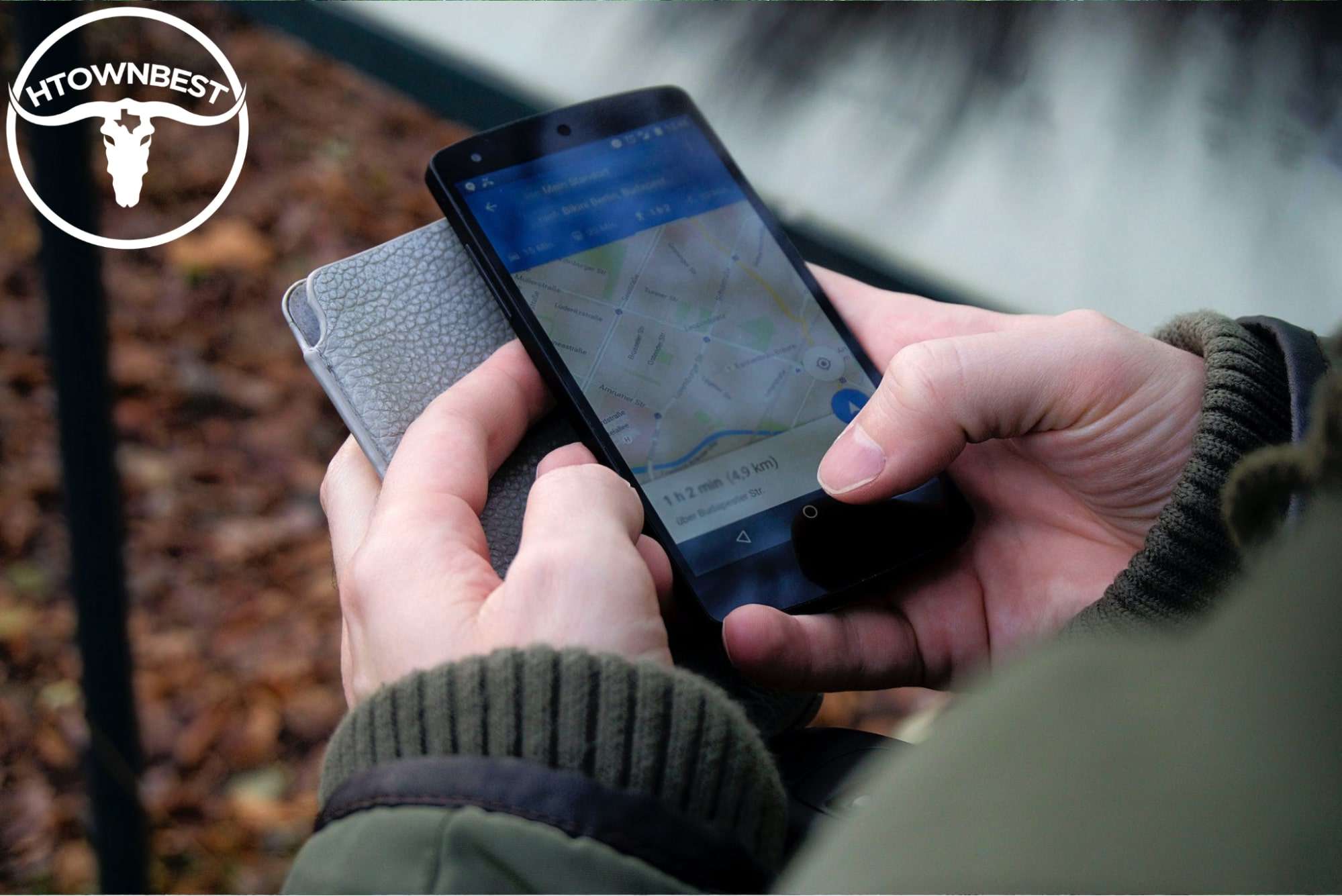Why does my phone think I’m in Houston?

- Poor GPS Signal
- Wi-Fi and Carrier Network Issues
- Malfunctioning Hardware
- Outdated Software and Software Bugs
- Privacy Settings
- Incorrect Time and Date Setting
- Traveling Between Time Zones
- Battery Saver Mode
- Tall Structures and Dense Foliage
- Weather
- Multiple Devices Using the Same Account
- Location Spoofing
- Location Caching
- How do I fix it when my phone thinks I’m in Houston?
Have you ever checked your phone and been shocked to see that it thinks you’re in a city that you’ve never even visited?
Maybe you woke up one morning and your phone claimed that you were in Houston, Texas, even though you live on the other side of the country. While this may seem like a random glitch, there’s actually a lot more to it than that.
So buckle up and get ready for a wild ride as we investigate this digital conundrum!
Poor GPS Signal

Weak GPS signals can cause your phone to think it’s in Houston. Global Positioning System (GPS) technology uses signals transmitted from a network of satellites in orbit around the Earth to determine the precise location of a receiver on the ground.
But, the accuracy of the GPS receiver’s calculations is dependent on the strength and quality of the signals it receives from the satellites.
If a phone is unable to receive a strong signal from GPS satellites, it may have difficulty accurately determining the user’s location. Just like when your phone tells you you’re in Downtown Houston, when you only wish you could be there!
This can happen for a number of reasons, like interference from tall buildings or other obstructions, being indoors or underground, or simply having a faulty GPS receiver.
In such cases, the GPS signal may be weak or non-existent, leading to inaccurate location data or no data at all.
Wi-Fi and Carrier Network Issues

Problems with Wi-Fi and networks can make your phone think you’re in Houston or any other location.
Many smartphones use Wi-Fi networks to determine their location. This process, known as Wi-Fi positioning, involves the phone scanning for available Wi-Fi networks and using their signal strength to estimate the device’s location.
But, Wi-Fi positioning can also be affected by various factors, including interference or weak signals from nearby networks.
If the phone is unable to accurately identify and differentiate between different Wi-Fi networks, it may result in incorrect location readings.
This can be particularly problematic in crowded areas such as airports or shopping malls, where multiple networks may be competing for signals.
Another issue that can affect a phone’s ability to determine its location is carrier network issues. If the phone is unable to connect to the carrier’s network, it may not be able to receive the necessary information to accurately calculate its location.
This can occur for various reasons, such as network outages, weak signal strength in a particular area, or incompatible network settings.
Problems with network or Wi-Fi connectivity might be why you’re sitting in a crowded subway, but your phone thinks you’re swimming at a serene lake in Houston.
Malfunctioning Hardware

Sometimes hardware components in your phone, like your GPS chip, can malfunction or become faulty which can result in inaccurate location readings like your phone thinking you’re relaxing at a lovely beach in Houston.
Your mobile device’s location tracking technology relies on a combination of GPS satellites, cellular network towers, and Wi-Fi signals to determine your location accurately.
Outdated Software and Software Bugs

Having an outdated operating system or location-based apps can cause issues with the accuracy of your device’s location services which might be why your phone wrongfully thinks you’re in Houston.
Over time, changes to GPS satellites and cellular towers can cause inaccuracies in location detection.
Outdated software may not be able to accurately determine your location. This is because newer versions of operating systems and apps often include improvements in location tracking technology..
Software bugs and glitches can also cause location-based apps to display the wrong location. When a software bug or glitch occurs, it can cause apps to report incorrect location information or even prevent them from detecting your location at all.
These bugs can be caused by a range of factors, including issues with the GPS receiver, problems with the app’s code, or errors in the way that the app interprets location data.
Privacy Settings

Privacy settings and app permissions can block your phone’s GPS signal transmission and cause an inaccurate location reading of you being in Houston.
Some users may have turned off location services or set their privacy settings to not allow location tracking, which can result in location data being unavailable or inaccurate.
Another factor that can affect the accuracy of location-based apps is app permissions. Some apps require access to your phone’s location data to function properly, such as navigation apps or social media apps that use location to tag posts or check-ins.
If you haven’t granted these apps permission to access your location, they may not be able to accurately determine your location or provide location-based services.
Incorrect Time and Date Setting

If your phone’s date and time settings are incorrect, it may cause location-based apps to inaccurately display Houston as your current whereabouts. Your phone’s date and time settings play an important role in location-based apps and services.
This is because location tracking relies on a combination of GPS signals, cellular network information, and time data to determine your location accurately.
GPS signals are time-stamped with the time and date when they were sent from the GPS satellites. When your phone receives these signals, it uses the timestamps to calculate your location accurately.
Similarly, cellular network towers also use time data to provide location information. If your phone’s date and time settings are incorrect, it may affect the accuracy of the location data provided by these towers.
Traveling Between Time Zones

When traveling between different time zones, your phone GPS system can get confused and cause it to report incorrect or outdated information, thereby displaying the wrong location like Houston even when you’re somewhere else.
Furthermore, the phone’s network connection may also be affected by the change in time zones, leading to delayed or inconsistent updates of location data. It can show your old locations instead of the new one.
Another potential issue when traveling between different time zones is that some apps and services on your phone may not be designed to handle these changes correctly at your new location.
Battery Saver Mode

Having battery-saving mode might make your phone think it’s in Houston when you actually aren’t. When your phone enters battery saver mode, it aims to conserve battery life by reducing the power consumption of various features and processes.
One of the ways it does this is by limiting the use of GPS and other location-based services, which are known to be battery-intensive functions.
When battery saver mode is enabled, the phone may reduce the power allocated to these hardware components, resulting in slower or less frequent updates of location data.
In some cases, your phone may even fail to report your location altogether, leaving you without access to critical services or features.
Tall Structures and Dense Foliage

Being in between tall buildings or dense trees may make your phone display your current location as Houston when you aren’t actually there.
There are several environmental factors that can interfere with GPS signals and cause inaccuracies in your phone’s reported location.
One of the most common factors is tall buildings and other structures that obstruct the GPS signals from reaching your phone. This is especially common in urban areas.
GPS signals can bounce off the structures and create a phenomenon known as “multipath interference,” where the signals arrive at your phone from different angles and times, causing confusion and inaccuracies in the location data.
Similarly, heavily wooded areas with dense foliage can also interfere with GPS signals, as the leaves and branches can absorb and reflect the signals, causing them to weaken or scatter.
Weather

Weather conditions can affect the accuracy of GPS signals and report that you’re located in Houston falsely.
Heavy cloud cover, rain, and other precipitation can interfere with GPS signals, as the water droplets can absorb or scatter the signals. This can reduce their strength and make it harder for your phone to determine your location accurately.
This is particularly relevant for outdoor activities such as hiking or camping, where weather conditions can change rapidly and impact your ability to navigate using GPS.
Multiple Devices Using the Same Account

When you access an account across different devices, your current location might be displayed as something inaccurate like Houston, Texas.
When multiple devices are connected to the same account, they may be sharing location data, especially if they have location services enabled.
This means that your phone’s GPS data may be combined with location data from your tablet or laptop, which can cause confusion and inaccuracies in location readings.
Additionally, some devices may prioritize one source of location data over another, leading to discrepancies in the reported location.
For example, your phone may rely more heavily on GPS data, while your laptop may use Wi-Fi or IP address data to determine your location, resulting in different reported locations.
Location Spoofing

One reason why a phone may incorrectly display your location as Houston is due to the use of certain apps or tools that allow users to spoof or fake their phone’s location, like VPN apps.
These apps and tools can override the phone’s GPS system and provide false location information to other applications or services that rely on the phone’s location data.
For example, a user may use a location spoofing app to appear as if they are located in a different country or city, even if they are physically located somewhere else.
This is often used for accessing location-restricted content or services, like shows on streaming platforms. However, it can also cause confusion or problems if the phone’s actual location is needed for important tasks, such as emergency services or navigation.
Location Caching

One reason why a phone may tell you you’re in Houston when you are elsewhere is due to its caching mechanism. When you use GPS on your phone, it collects location data and stores it in its cache.
This cache can hold onto old location data, which can cause your phone to display the wrong location until it updates with new data.
For example, if you are indoors and your phone cannot get a clear GPS signal, it may rely on the last known location it has in its cache, like that last trip you took to art galleries around Houston.
If you had previously been in a different location, your phone may display that old location until it updates with new data from GPS satellites.
How do I fix it when my phone thinks I’m in Houston?

When your phone is going haywire and is showing that you are at a Houston bar, restaurant, park, or tourist spot, when you’re not, there are some ways to solve this issue.
Here are some solutions you can try:
- Turn location on and off. Check if your phone’s location services are turned on. If it is, try turning it off and then back on again. This will refresh the location data and may fix the issue.
- Restart your phone. Sometimes, a simple restart can fix location-related issues on your phone.
- Is your phone software up to date? Make sure your phone’s software is up to date. Check for any updates in your phone’s settings and install them if available.
- Check your Wi-Fi or cellular data. If you are having issues with location, try turning off Wi-Fi and/or cellular data and then turning it back on again.

- Reset your network settings. If none of the above solutions work, try resetting your network to its default settings. To do this, go to your phone’s settings and look for “reset network settings.”
- Clear cache and data for location-based apps. Clear the cache and data for apps that use your location, such as Google Maps or Apple Maps. Go to your phone’s settings, select “Apps & notifications,” find the app in question, and select “Storage & cache.”
- Check for GPS signal interference. If you’re in a building or an area with a lot of obstructions, your phone’s GPS signal may be weak or blocked. Try going outside or to a more open area to see if your phone’s location improves.
- Factory reset your phone. If all else fails, a factory reset may be necessary to fix any software or hardware issues affecting your phone’s location.
Note that this will erase all data on your phone, so be sure to back up any important files beforehand.
- Contact your phone manufacturer or network carrier. If the issue persists, it may be a hardware or software issue that requires professional help. Contact your phone manufacturer or carrier for assistance.





